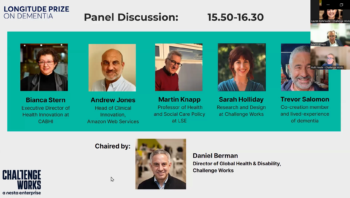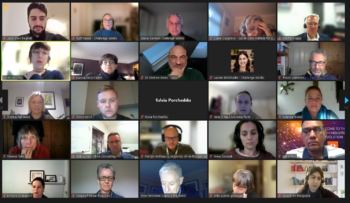Challenge Works Dementia Innovator Hackathons
8 December 2022
- Longitude Prize on Dementia
- Programme Manager
- Ruth Neale
Where two worlds meet to drive game-changing ideas for dementia
Last month, The Longitude Prize on Dementia, part of Challenge Works, hosted over 115 international participants and speakers for two dementia hackathons to connect innovators with experts and people living with dementia.
The goal was to help innovators better understand the condition and to support strong entries to the prize that will increase the chances of successful solutions and outcomes that have life-changing impact.
Participants joined from across the globe, including the UK, South Africa, India, Canada, US, Brazil, Hong Kong and Israel with experience spanning areas including gaming and robotics.
We saw small businesses who are working on cognitive ability apps, through to innovators developing robots for children with learning difficulties.
A huge number of insights came from running the two virtual hackathons and some of the key takeaways included the following:
1. Technology has the power to close the cognitive gap
While technology has evolved hugely over the last 20 years, we are seeing a correlation of human skills being lost.
2. True co-creation is iterative
True co-creation is not about people living with dementia liking an innovator’s idea, and not about innovators getting it right first time, according to Bianca Stern, Executive Director of Health Innovation at Centre for Aging + Brain Health Innovation (CABHI) in Canada. Bianca has run CABHI’s Lived Experience Advisory Panel and co-creation for eight years.
The interaction between someone living with dementia and the innovator is crucial, but it’s not a one-off – it’s a process.

3. Can products drive demand?
How does an innovator get the balance right when presenting a new technological idea?
They want to bring something new and game-changing but need to ensure it will be well received and adopted. No-one knew they needed a mobile until it was in their hands and sometimes innovators need to create to give their audience something to react to.
Innovative solutions and technologies have the potential to inspire people living with dementia, as much as the needs of those living with dementia could drive the creation of solutions. Innovators can’t afford to play it safe. They need to take risks and think not about what living with dementia looks like now, but what it might look like in 20 years.
The prize is designed to enable innovators to drive new ideas and take risks in a safe environment and then seek feedback so they can evolve and develop thier ideas. This creates an environment where true game-changing ideas can come to life.
4. Technology can be a prompt
People living with dementia can sometimes have problems learning new things due to gaps that develop in cognitive function as the disease progresses.
Technology can only go so far in bringing back skills that have been lost. However, it certainly has the power to remind individuals of the actions needed to recreate the skills they had before.
For example, an Alexa speaker can talk through the steps involved in making a cup of tea, but do they know where the kettle, tea or milk is? Is there a missing piece of technology that could help them to do this?

There is so much potential for AI and machine-based technologies to fill the gaps for those living with dementia.
The right innovators, who have co-created their ideas – could make this a reality and have the potential to drive life-changing impact for many.
For more information on our dementia hackathons or advice from our expert speakers:
Innovators can enter their solutions to the prize until 26th January 2023.
To enter the prize, or for more information:
